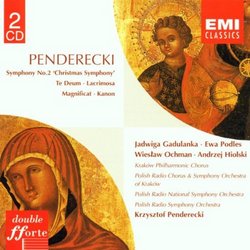| All Artists: Krzysztof Penderecki, Jadwiga Gadulanka, Ewa Podles, Wieslaw Ochman, Polish Radio National Symphony Orchestra Title: Symphony No. 2; Te Deum; Lacrimosa; Magnificat; Kanon Members Wishing: 0 Total Copies: 0 Label: EMI Classics Release Date: 2/12/2002 Genre: Classical Styles: Opera & Classical Vocal, Historical Periods, Early Music, Modern, 20th, & 21st Century, Symphonies Number of Discs: 2 SwapaCD Credits: 2 UPCs: 724357485227, 724357485258 |
Search - Krzysztof Penderecki, Jadwiga Gadulanka, Ewa Podles :: Symphony No. 2; Te Deum; Lacrimosa; Magnificat; Kanon
 | Krzysztof Penderecki, Jadwiga Gadulanka, Ewa Podles Symphony No. 2; Te Deum; Lacrimosa; Magnificat; Kanon Genre: Classical
|
Larger Image |
CD Details |
CD ReviewsIncreasingly a "one note" Composer Christopher Forbes | Brooklyn,, NY | 08/01/2002 (3 out of 5 stars) "I am glad that I have this CD. Some of these works haven't been available since the days of the LP and I've missed them. I attended a live performance of the Magnificat with Penderecki conducting when I was a teen ager and have always loved the piece. That being said, this twofer of works from EMIs catalogue of 70s and 80s pieces by Penderecki have convinced me that he is increasingly a "one-note" composer...his "one-note" is interesting, but I'd like to see some change. What I mean is this, every work on this CD is Tragic. Even if the words of the works really shouldn't be. Case in point is the Te Deum. The work breaths heaviness from the very opening. It sounds much more like a funeral mass than a joyous hymn to God. Musically, the work is quite powerful, but you get the feeling that Penderecki would have preferred to be writing another Passion. The same criticism could be held up to the earlier Magnificat. But to me, that work is superior in that the emotional energy is fresher. The work is a significant step forward from the St. Luke Passion, intense and moving. Even the "Christmas" symphony suffers from an excess of melancholy. I've never heard a more depressing piece of "Christmas" music. Not that the work was intended as such, but if you are going to place such a subtitle on a piece, you have to realize that you set up expectations in the listener's mind. I guess the problem to me is that throughout his career Penderecki has had two emotional modes, tragic and demonic. He never shows the lightness that you might hear in Lutoslawski's Venitian Games, or the playfullness of Ligeti's later work. This becomes more and more of a problem the older Penderecki gets. You get the feeling that everything that you hear from him has been heard before. This is not to underate the composer. I still admire many of his works, especially the Threnody, Polymorphia, the St. Luke Passion, the Magnificat (the whole reason to buy this CD) and the First Violin Concerto. It's just that so many other works of his sound like they are mining the same vein, and the gold ran out of that vein a long time ago. Go ahead Penderecki fans and give me the unhelpful votes. I'm ready for them. But ask yourselves in 10 years if you will listening to most of the works on this album again. My bet is, with a few exceptions, such as the Magnificat, the answer will be no."
|

 Track Listings (2) - Disc #1
Track Listings (2) - Disc #1